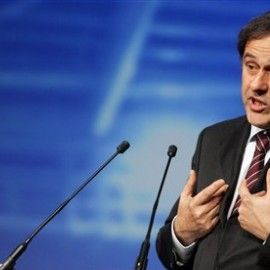
In a keynote speech in Geneva to the United Nations member states attending a high-level event on racism in football, Mr Platini said that "the most beautiful game in the world" could help set an example through its popularity and social standing, and serve to transmit values that could help change attitudes in relation to these negative phenomena. The UEFA President was invited to the event organised by the Intergovernmental Working Group on the Effective Implementation of the Durban Declaration and Programme of Action as special guest speaker by the UN High Commissioner for Human Rights, Navanethem Pillay.
The speech came ahead of the high-profile promotion of the anti-racism campaign on UEFA Champions League and UEFA Europa League matchday three from 22-24 October, as part of the FARE Action Weeks organised by UEFA's long-standing partner, the FARE network. The Intergovernmental Working Group, composed of representatives of UN member states, is one of the bodies established following the Durban Declaration adopted during the World Conference against Racism in Durban, South Africa in 2001, and Mr Platini's speech began its 11th session, which continues until 18 October.
"In football and in everyday life, we are doing much more than simply combating racism. We are fighting discrimination in all its forms," the UEFA President said. "I do not need to tell you that the societies in which we live are increasingly complex and diverse. People are frequently subjected to numerous pressures, to physical or mental harassment, often daily. These pressures are the result of their physical appearance, ideas, beliefs, gender or sexual preferences.
"Football, the world's most popular sport, reflects the society in which it flourishes. It reflects its values, but also, unfortunately, its prejudices, fears and mistrust.
"Of course, this extraordinary popularity also brings responsibilities," Mr Platini reflected. "It is precisely because of that popularity that football must serve as a vehicle for values that can help make society more tolerant of diversity. At the same time, those who govern our sport have a duty to protect the players, in what is their place of work, from all forms of discrimination. They have a right to be treated with respect, it is as simple as that."
The UEFA President spoke of UEFA's Respect campaign, launched by Mr Platini in 2008 to tackle "the evils that often plague our sport". He added: "One such evil, which we are particularly determined to eradicate, is discrimination … a scourge that has been ravaging human societies since the dawn of time and that has provoked the greatest tragedies known to mankind.
"Nowadays," Mr Platini reflected, "football doesn't tolerate any form of discrimination, whether racial, cultural, religious, sexist or homophobic. Likewise, it recognises no hierarchy of evil. For more than a decade, European football has had to deal with all kinds of racist, xenophobic and extremist behaviour. In the vast majority of cases, this behaviour is the work of small, organised groups that have chosen to express their hatred for others in a football stadium to exploit the popularity and media coverage enjoyed by our sport."
The UEFA President highlighted measures introduced by the European body, as part of a zero-tolerance attitude towards racism and intolerance. These include working with civil society, and combining an educational approach with appropriate repressive measures and awareness campaigns linked to UEFA activities.
TV spots have been broadcast before UEFA matches; referees have been authorised to interrupt, suspend or abandon matches in the event of racist behaviour in the stadium; harsher penalties are laid down in UEFA's disciplinary regulations, including a ten-match ban for players or officials guilty of racist conduct; furthermore, if supporters of a club or national team engage in racist behaviour, this must be sanctioned, for a first offence, with a partial stadium closure concerning the section where the racist incident occurred. For a second offence, this must be sanctioned with a full stadium closure.
Mr Platini admits that this all shows that racism remains a problem in certain parts of Europe. "But it also means that UEFA is taking steps and acting decisively in order to eradicate this evil," he said. "We are not just talking a good game; we are facing up to our responsibilities. Our attitude, which I am proud to describe as uncompromising, is not always the most popular within the football family, but as the saying goes: 'Spare the rod and spoil the child'. UEFA does not fight discrimination in order to increase its popularity … it does so because this is the right thing to do.
"Football, however, is merely the tip of the iceberg in societies in which the situation is so bad that the social integration process has, unfortunately, broken down completely. On the other hand, because it is often more open to diversity than the rest of society, progress can be made more easily in football than in other social fields. And it is because football is the most beautiful game in the world, and so popular, that we can legitimately hope that the example it must set will have positive repercussions on the whole of society."
Mr Platini said that football was "a sport that has had the courage to take the bull by the horns and face the challenge of rises in discriminatory behaviour ... [and] without the legislative, judicial and political support of state authorities, our efforts would be in vain.
"The message of sport is a universal one aimed particularly at the citizens of tomorrow," the UEFA President concluded. "Let us do everything to ensure that it is a message of justice, serenity and hope."
Before giving his speech in Geneva, Mr Platini held a working meeting with Navanethem Pillay. Cooperation is envisaged in the future between UEFA and the United Nations, through the Office of the High Commissioner for Human Rights.